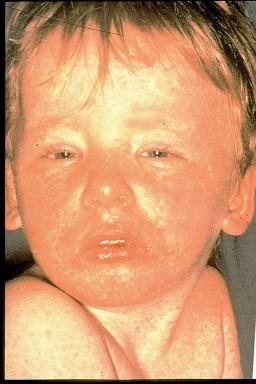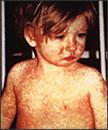Measles Cases Hit Record High in Europe & Outbreaks in the Americas
Source: World Health Organization Regional Office for Europe [edited]
Over 41 000 children and adults in the WHO European region have been infected with measles in the first 6 months of 2018. The total number for this period far exceeds the 12-month totals reported for every other year this decade. So far, the highest annual total for measles cases between 2010 and 2017 was 23,927 for 2017, and the lowest was 5,273 for 2016. Monthly country reports also indicate that at least 37 people have died due to measles so far this year [2018].
"Following the decade's lowest number of cases in 2016, we are seeing a dramatic increase in infections and extended outbreaks," says Dr Zsuzsanna Jakab, WHO Regional Director for Europe. "We call on all countries to immediately implement broad, context-appropriate measures to stop further spread of this disease. Good health for all starts with immunization, and as long as this disease is not eliminated we are failing to live up to our Sustainable Development Goal commitments."
Of the countries in the region, 7 have seen over 1000 infections in children and adults this year [2018] (France, Georgia, Greece, Italy, the Russian Federation, Serbia, and Ukraine). Ukraine has been the hardest hit, with
over 23,000 people affected; this accounts for over half of the regional total. Measles-related deaths have been reported in all of these countries, with Serbia reporting the highest number of 14.
"This partial setback demonstrates that every person who is not immune remains vulnerable no matter where they live, and every country must keep pushing to increase coverage and close immunity gaps, even after achieving interrupted or eliminated status," says Dr Nedret Emiroglu, Director of the Division of Health Emerge
ncies and Communicable Diseases at the WHO Regional Office for Europe.
This link is a CDC webinar with useful Measles information. It is a little technical, but not without value to the general public. I hope you will find it of interest: https://emergency.cdc.gov/coca/calls/2019/callinfo_052119.asp.
Measles Can Be Stopped
The measles virus is exceptionally contagious and spreads easily among susceptible individuals. To prevent outbreaks, at least 95 percent immunization coverage with 2 doses of measles-containing vaccine is needed every year in every community, as well as efforts to reach children, adolescents and adults who missed routine vaccination in the past.
While immunization coverage with 2 doses of measles-containing vaccine increased from 88 percent of eligible children in the region in 2016 to 90 percent in 2017, large disparities at the local level persist: some communities report over 95 percent coverage, and others below 70 percent.
WHO is working closely with Member States currently facing outbreaks to implement response measures, including enhanced routine and supplemental immunization as well as heightened surveillance to quickly detect cases. WHO is also working with other countries to attain the 95 percent threshold.
"At this midterm juncture for the European Vaccine Action Plan, we must celebrate our achievements while not losing sight of those who are still vulnerable and whose protection requires our urgent and ongoing attention," concludes Dr Jakab. "We can stop this deadly disease. But we will not succeed unless everyone plays their part: to immunize their children, themselves, their patients, their populations -- and also to remind others that vaccination saves lives."
Source: Mirror [edited]
Measles cases have hit a record high across Europe with more than 41,000 children and adults infected in the 1st 6 months of this year [2018]. That figure is nearly double the highest number of yearly cases recorded since 2010.
At least 37 people are thought to have died due to the highly contagious disease so far this year [2018], although there have been no fatalities in the UK.
Between July 2017 and June 2018, there were just under 1000 cases of measles in Britain, compared to 531 confirmed cases for the whole of 2016. Meanwhile, there have been 760 cases in the 1st 6 months of this year [2018] in the UK alone compared to 187 in the last half of 2017.
"Following the decade's lowest number of cases in 2016, we are seeing a dramatic increase in infections and extended outbreaks" said Dr Zsuzsanna Jakab, World Health Organization (WHO) Regional Director for Europe.
"We call on all countries to immediately implement broad, context-appropriate measures to stop further spread of this disease.
"Good health for all starts with immunization, and as long as this disease is not eliminated we are failing to live up to our Sustainable Development Goal commitments."
In May [2018], it was reported that the UK was facing unprecedented cases of measles.
Anyone who has not received 2 doses of the MMR [measles, mumps, rubella] vaccine is at risk, while young people mixing in close proximity, for example at festivals or at University, are more vulnerable.
Last year [2017], measles cases rocketed by 300 percent across Europe as some parents refused to vaccinate their children. That led to more than 20,000 people being infected causing 35 deaths, according to figures from the WHO.
Before the introduction of a measles vaccine in 1963, there were serious epidemics every 2-3 years, causing an estimated 2.6 million deaths globally each year.
Measles had virtually been eradicated in Britain before confidence in the MMR vaccine collapsed in the late 1990s after now-discredited Dr Andrew Wakefield wrongly claimed the measles, mumps, and rubella jab was linked to autism.
The best way to prevent outbreaks is to ensure that at least 95 percent of the population is immunized with 2 doses of the measles vaccine. High rates of vaccination allow for "[community] immunity" that can protect vulnerable people such as infants who are too young to be vaccinated and those who can't be vaccinated because of medical reasons.
But vaccine skepticism remains high in many parts of Europe. A 2016 global survey of vaccine confidence led by researchers at the London School of Hygiene and Tropical Medicine found Europe to be the region that was least confident in vaccine safety.
In Italy, for example, a loud anti-vaccination movement has been bolstered by populist, anti-establishment politicians, reported the Associated Press. In Romania, superstitions abound, such as using cabbage juice to ward off the disease, while celebrities such as TV star Olivia Steer have publicly promoted anti-vaccine stances.
While immunization rates increased among eligible children in Europe in 2016, there are still some communities that report below 70 percent coverage.
WHO says it is working closely with those countries currently facing outbreaks to implement enhanced immunization as well as heightened surveillance to quickly detect cases.
"We can stop this deadly disease," said Jakab. "But we will not succeed unless everyone plays their part: to immunize their children, themselves, their patients, their populations -- and also to remind others that vaccination saves lives."
Source: Forbes [edited]
Being purists, the CDC is not calling the current upswing in measles cases an "outbreak" -- defined as 3 cases in an area within a month -- but any "reasonable person" would likely do so.
In 2000, we said that measles had been eliminated in the US. In 2016, there were 86 cases, and in 2017, 118 cases. The year is only half over, yet we already have 107 cases across 21 states and DC, including 8 clusters that meet the CDC definition.
Hopefully, we won't have a repeat of some of the larger recent outbreaks --like Disneyland in the winter of 2014-15, which resulted in 145 cases in 7 states and 2 other countries, or the 383 cases, mostly among unvaccinated Amish in Ohio, but there is a growing threat of larger outbreaks due, in large part, to changes in immunization patterns and lower rates of vaccination.
Many dismiss measles almost as a rite of passage. We have been so successful, that most people have never seen a case nor understand how serious it can be, with high fevers. One in 10 get ear infections; this may lead to life-long complications, like the deafness of one of my friends. One out of every 20 children with measles gets pneumonia, and this is a common cause of death. One child of 1000 will get encephalitis, a brain inflammation and swelling that can leave seizures, blindness, deafness, or learning disabilities. Worst, measles kills 1-2 per 1000 infected kids.
Roald Dahl's description of his 7-year-old daughter's death [The Washington Post <https://tinyurl.com/yd57tnvv>] is heartbreaking.
All of this is readily avoided by a series of 2 immunizations.
Measles is transmitted through the air, or by droplets, so just being near someone is enough to get infected. The virus can remain in the air and be transmitted even after the infected person has left the room. It is highly
contagious -- if one person has measles, 90 percent of those close to the index person will also become ill. Making measles even more easily transmitted is that people are contagious for up to 4 days before the rash appears.
Infection may easily be missed, as most physicians have never seen a case, and it won't be high on their radar. It can look similar to an allergic drug rash, but measles is often accompanied by fever, cough, runny nose, and conjunctivitis, where a drug rash is more likely itchy and without these other symptoms.
More than 10 percent of those infected require hospitalization.
Communicated by:
ProMED-mail Rapporteur Mary Marshall
Measles is easily controlled with a safe and efficacious vaccine, MMR (measles, mumps, rubella). There is no reason children have to suffer severe disease from measles and in some cases die due to this disease. It is irresponsible of parents not to have their children vaccinated; the link between vaccination and autism has been disproved, yet parents continue to cling to it. The consequences are clearly evident from the global increase in disease following measles infection. And it is particularly important to protect children who cannot be immunized due to immunological issues, such as children receiving chemotherapy to treat cancer and other conditions. Furthermore, it is far more costly to treat individuals following infection because they have not been vaccinated.
It is not only measles that one can easily protect against by vaccination, but also other vaccine-preventable diseases. There was recently a case of varicella (chicken pox) in an 11-month baby causing a stroke after infection, the virus
having been transmitted from unvaccinated older siblings , demonstrating why chickenpox vaccine is so important.
"The case highlights the dangers -- both to one's own children and to those of others -- that are associated with skipping vaccinations. Widespread vaccination protects kids who can't get vaccinated either because they are younger than 1 year, like the boy in the report, or because they have immune system problems. In recent months, there have been numerous chickenpox outbreaks around the country, a result of pockets of parents who have opted not to vaccinate, assuming either that their kids won't get the disease or will simply tough it out if they do."
___________
A confirmed case of measles prompted Contra Costa County, California public health officials on Wed [22 Aug 2018] to warn residents and visitors they may have been exposed to the highly contagious airborne illness. The infected person visited several popular indoor venues in Contra Costa County, Los Angeles County, and Arizona, and officials in the latter areas have issued their own advisories.
This serves as a reminder that even though the USA is considered free of measles, i.e., no endemic transmission except through introduced cases, measles can be brought into the country by tourists and following travel by citizens to regions where there still are a high number of measles cases. According to the WHO, measles cases have reached a record high in Europe this year [2018], with more cases recorded in the first 6 months of 2018 than any other 12-month period this decade. Therefore, parents must maintain vaccination of their children.
[2] PAHO / WHO Epidemiological Update 20 Aug 2018
Source: PAHO / WHO [edited]
Between epidemiological week (EW) 1 and EW 33 of 2018, a total of 5,004 confirmed measles cases, including 68 deaths, were reported in 11 countries in the Americas:
Antigua and Barbuda (one case),
Argentina (8 cases),
Brazil (1237 cases, including 6 deaths),
Canada (19 cases),
Colombia (60 cases),
Ecuador (17 cases), Guatemala (one case),
Mexico (5 cases),
Peru (4 cases),
the USA (107 cases),
and the Bolivarian Republic of Venezuela (3545 cases, including 62 deaths).
Commentary by Dr. T:
The world gets smaller every year. We live in an international city. We go to Europe and Europe comes to us as do other parts of the Americas and the rest of the world as well. Maintaining our community protected by safe and effective immunizations for adults and children is everyone's responsibility. We are our brothers' keepers. Talk to your doctors about your immunization status and that of your families.

